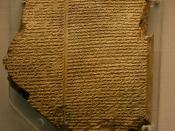Flood Myths: Similar Ancient Greek and Mesopotamian Beliefs
When I was a child in bible study school my favorite story was the chronicle of Noah's Ark. The fact that he and the animals on his ark renewed all life on earth always fascinated me. Flood myths are a reoccurring theme that is popular in many ancient and modern religions. Many theories exist that try to explain the similarities of these ideas. Carl Jung's theory of archetypal myths can clarify the mystery of why they are the same. Jung discovered that certain emotions, situations, and actions are universal in all peoples subconscious. Cultural diffusion is another possible cause of these resemblances. This occurs when people of different cultures travel to different areas and incorporate their beliefs into existing ones thus altering them. Whatever the case may be flood stories have a deeper message that underlies the literal meanings of the stories.
Flood Myths symbolically tell a tale of life, death, and the rebirth of the earth and humanity.
The oldest surviving written story in world literature is The Epic of Gilgamesh. In this account the Mesopotamian god Enlil uses a massive flood in order to silence a noisy city so that he may rest undisturbed. Another Mesopotamian god, EA, warns the king of Sumer, Utnapishtim, and gives him some instructions so that he and other living creatures may survive the coming storm. EA tells the king, "These are the measurement of the barque as you shall build her: let her beam equal her length, let her deck be roofed like the vault that covers the abyss; than take up into the boat the seed of all living creatures"(108). With these words Utnapishtim is given the responsibility of safeguarding the foundation of all life from the certain death this massive flood...



Good
Very good content...very detailed and informative...
6 out of 7 people found this comment useful.